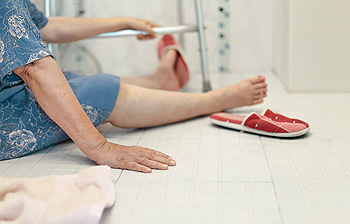 The fear of falling is something that plagues many older adults. Falls can result in many other health complications, such as broken bones that lead to more serious issues. Recovery can be a long and straining process, so it is best to practice fall prevention in order to avoid these stressful inconveniences. There are techniques and behaviors one can utilize to prevent falling. Some communities have partnered with organizations to offer falls prevention classes for anyone who is interested. These programs hope to lessen the fear surrounding falling, while simultaneously increasing the activity of older adults. Sometimes, the fear of falling causes some to lower their activity level, which results in weakness that can cause more damage if a fall does occur. If you fear falling or have any further questions about falls prevention, then it is recommended you consult with a podiatrist for more information.
The fear of falling is something that plagues many older adults. Falls can result in many other health complications, such as broken bones that lead to more serious issues. Recovery can be a long and straining process, so it is best to practice fall prevention in order to avoid these stressful inconveniences. There are techniques and behaviors one can utilize to prevent falling. Some communities have partnered with organizations to offer falls prevention classes for anyone who is interested. These programs hope to lessen the fear surrounding falling, while simultaneously increasing the activity of older adults. Sometimes, the fear of falling causes some to lower their activity level, which results in weakness that can cause more damage if a fall does occur. If you fear falling or have any further questions about falls prevention, then it is recommended you consult with a podiatrist for more information.
Preventing falls among the elderly is very important. If you are older and have fallen or fear that you are prone to falling, consult with one of our podiatrists from Lovely Foot Associates, PC. Our doctors will assess your condition and provide you with quality advice and care.
Every 11 seconds, an elderly American is being treated in an emergency room for a fall related injury. Falls are the leading cause of head and hip injuries for those 65 and older. Due to decreases in strength, balance, senses, and lack of awareness, elderly persons are very susceptible to falling. Thankfully, there are a number of things older persons can do to prevent falls.
How to Prevent Falls
Some effective methods that older persons can do to prevent falls include:
Falling can be a traumatic and embarrassing experience for elderly persons; this can make them less willing to leave the house, and less willing to talk to someone about their fears of falling. Doing such things, however, will increase the likelihood of tripping or losing one’s balance. Knowing the causes of falling and how to prevent them is the best way to mitigate the risk of serious injury.
If you have any questions, please feel free to contact our office located in Johnstown, PA . We offer the newest diagnostic and treatment technologies for all your foot care needs.
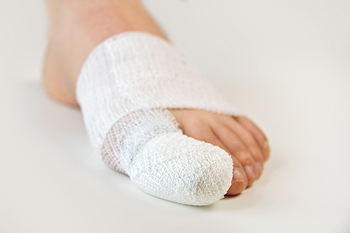 There are several ways a broken toe may occur. These may include dropping a heavy object on the toe, stubbing it on a piece of furniture, or consistent impact that can cause a stress fracture. One of the first symptoms felt may be severe pain. Many people may also notice bruising and swelling around the affected toe and surrounding areas. A cast may be needed if the fracture is severe, and the toe may look deformed. After the injury occurs, it can be beneficial to elevate the foot, and this can be helpful in reducing any swelling that may be present. Some patients find that support and stability may be increased if the affected toe is taped to the toe next to it. As the healing process begins, it is important to rest the foot as often as possible. When the splint or tape is removed, the toe's range of motion can increase as stretching exercises are performed. If you have broken your toe, it is advised that you speak to a podiatrist who can recommend the correct treatment.
There are several ways a broken toe may occur. These may include dropping a heavy object on the toe, stubbing it on a piece of furniture, or consistent impact that can cause a stress fracture. One of the first symptoms felt may be severe pain. Many people may also notice bruising and swelling around the affected toe and surrounding areas. A cast may be needed if the fracture is severe, and the toe may look deformed. After the injury occurs, it can be beneficial to elevate the foot, and this can be helpful in reducing any swelling that may be present. Some patients find that support and stability may be increased if the affected toe is taped to the toe next to it. As the healing process begins, it is important to rest the foot as often as possible. When the splint or tape is removed, the toe's range of motion can increase as stretching exercises are performed. If you have broken your toe, it is advised that you speak to a podiatrist who can recommend the correct treatment.
Broken toes may cause a lot of pain and should be treated as soon as possible. If you have any concerns about your feet, contact one of our podiatrists from Lovely Foot Associates, PC. Our doctors will treat your foot and ankle needs.
What Is a Broken Toe?
A broken toe occurs when one or more of the toe bones of the foot are broken after an injury. Injuries such as stubbing your toe or dropping a heavy object on it may cause a toe fracture.
Symptoms of a Broken Toe
Although the injured toe should be monitored daily, it is especially important to have a podiatrist look at your toe if you have severe symptoms. Some of these symptoms include worsening or new pain that is not relieved with medication, sores, redness, or open wounds near the toe.
If you have any questions, please feel free to contact our office located in Johnstown, PA . We offer the newest diagnostic and treatment technologies for all your foot care needs.
 Patients who have cracked heels are aware of the discomfort and pain they may cause. A considerable amount of pressure is placed on the heels, and this may be noticed while walking. It may happen as a result of having extremely dry skin or standing for extended periods of time throughout the day. Additionally, if you have medical conditions, which may include psoriasis, diabetes, or a thyroid disorder, you may be prone to developing cracked heels. There are noticeable symptoms of this condition, which may include hard and callused skin surrounding the heel of the foot, and the skin in that area may appear to be brown or yellow. If you have this ailment, mild relief may be found by washing and drying the feet thoroughly, followed by utilizing a good moisturizer several times per day. If cracked heels are left untreated, an infection may develop, which may lead to cellulitis. If you have developed cracked heels, it is strongly suggested that you seek the counsel of a podiatrist who can properly diagnosis this condition and offer treatment options that are correct for you.
Patients who have cracked heels are aware of the discomfort and pain they may cause. A considerable amount of pressure is placed on the heels, and this may be noticed while walking. It may happen as a result of having extremely dry skin or standing for extended periods of time throughout the day. Additionally, if you have medical conditions, which may include psoriasis, diabetes, or a thyroid disorder, you may be prone to developing cracked heels. There are noticeable symptoms of this condition, which may include hard and callused skin surrounding the heel of the foot, and the skin in that area may appear to be brown or yellow. If you have this ailment, mild relief may be found by washing and drying the feet thoroughly, followed by utilizing a good moisturizer several times per day. If cracked heels are left untreated, an infection may develop, which may lead to cellulitis. If you have developed cracked heels, it is strongly suggested that you seek the counsel of a podiatrist who can properly diagnosis this condition and offer treatment options that are correct for you.
Cracked heels are unsightly and can cause further damage to your shoes and feet. If you have any concerns, contact one of our podiatrists from Lovely Foot Associates, PC. Our doctors can provide the care you need to keep you pain-free and on your feet.
Cracked Heels
Cracked heels appear unappealing and can make it harder for you walk around in sandals. Aside from looking unpleasant, cracked heels can also tear stockings, socks, and wear out your shoes. There are several methods to help restore a cracked heel and prevent further damage.
How Do You Get Them?
Dry skin is the number one culprit in creating cracked heels. Many athletes, walkers, joggers, and even swimmers suffer from cracked heels. Age and skin oil production play a role to getting cracked heels as well.
Promote Healing
Over the counter medicines can help, especially for those that need instant relief or who suffer from chronic dry feet.
Wear Socks – Wearing socks with medicated creams helps lock in moisture.
Moisturizers – Applying both day and night will help alleviate dryness which causes cracking.
Pumice Stones – These exfoliate and remove dead skin, which allows for smoother moisturizer application and better absorption into the skin.
Change in Diet
Eating healthy with a well-balanced diet will give the skin a fresh and radiant look. Your body responds to the kinds of food you ingest. Omega-3 fatty acids and zinc supplements can also revitalize skin tissue.
Most importantly, seek professional help if unsure how to proceed in treating cracked heels. A podiatrist will help you with any questions or information needed.
If you have any questions, please feel free to contact our office located in Johnstown, PA . We offer the newest diagnostic and treatment technologies for all your foot care needs.
Read more about Solutions for Cracked Heels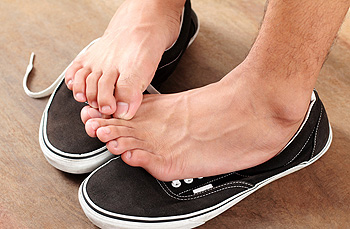 Hyperhidrosis is the medical term for a condition that causes excessive sweating all over the body. Plantar hyperhidrosis is a form of this condition that specifically affects the feet. This ailment usually begins in childhood or adolescence, and in severe cases can cause some physical limitations. The extra moisture can make the feet more prone to bacterial or fungal infections and blisters. Tinea pedis and pitted keratolysis are two examples of possible infections that can result from excess moisture. These two infections can easily be treated with antifungal cream, antibiotic cream, or medication. Plantar hyperhidrosis is symmetric, so it affects both feet equally. The sweating can range from mild excessive sweating to severe constant sweating. If you think you may have plantar hyperhidrosis, then it is recommended you consult with a podiatrist to learn new methods to help living with this condition.
Hyperhidrosis is the medical term for a condition that causes excessive sweating all over the body. Plantar hyperhidrosis is a form of this condition that specifically affects the feet. This ailment usually begins in childhood or adolescence, and in severe cases can cause some physical limitations. The extra moisture can make the feet more prone to bacterial or fungal infections and blisters. Tinea pedis and pitted keratolysis are two examples of possible infections that can result from excess moisture. These two infections can easily be treated with antifungal cream, antibiotic cream, or medication. Plantar hyperhidrosis is symmetric, so it affects both feet equally. The sweating can range from mild excessive sweating to severe constant sweating. If you think you may have plantar hyperhidrosis, then it is recommended you consult with a podiatrist to learn new methods to help living with this condition.
If you are suffering from hyperhidrosis contact one of our podiatrists of Lovely Foot Associates, PC. Our doctors can provide the care you need to attend to all of your foot and ankle needs.
Hyperhidrosis of the Feet
Hyperhidrosis is a rare disorder that can cause people to have excessive sweating of their feet. This can usually occur all on its own without rigorous activity involved. People who suffer from hyperhidrosis may also experience sweaty palms.
Although it is said that sweating is a healthy process meant to cool down the body temperature and to maintain a proper internal temperature, hyperhidrosis may prove to be a huge hindrance on a person’s everyday life.
Plantar hyperhidrosis is considered to be the main form of hyperhidrosis. Secondary hyperhidrosis can refer to sweating that occurs in areas other than the feet or hands and armpits. Often this may be a sign of it being related to another medical condition such as menopause, hyperthyroidism and even Parkinson’s disease.
In order to alleviate this condition, it is important to see your doctor so that they may prescribe the necessary medications so that you can begin to live a normal life again. If this is left untreated, it is said that it will persist throughout an individual’s life.
A last resort approach would be surgery, but it is best to speak with your doctor to find out what may be the best treatment for you.
If you have any questions please feel free to contact our office located in Johnstown, PA . We offer the newest diagnostic and treatment technologies for all your foot and ankle needs.
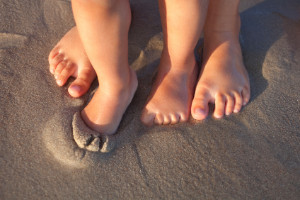 The human foot is comprised of several bones, ligaments, and muscles. It is important that our feet are flexible and stable so everyday activities can be completed with ease. Children may benefit at an early age from walking barefoot while indoors. This may help develop the grasping action in the toes, which can promote stability and muscle strength. Research has indicated the importance of measuring your child’s feet on a regular basis, and this is helpful in determining the correct shoe size. When choosing shoes for your child, it is important to ensure the foot is held firmly in place. This may be accomplished by choosing shoes that have laces or Velcro, which can hold the foot securely in the shoe. If you would like additional information on how to care for your child's feet, speak with your podiatrist.
The human foot is comprised of several bones, ligaments, and muscles. It is important that our feet are flexible and stable so everyday activities can be completed with ease. Children may benefit at an early age from walking barefoot while indoors. This may help develop the grasping action in the toes, which can promote stability and muscle strength. Research has indicated the importance of measuring your child’s feet on a regular basis, and this is helpful in determining the correct shoe size. When choosing shoes for your child, it is important to ensure the foot is held firmly in place. This may be accomplished by choosing shoes that have laces or Velcro, which can hold the foot securely in the shoe. If you would like additional information on how to care for your child's feet, speak with your podiatrist.
The health of a child’s feet is vital to their overall well-being. If you have any questions regarding foot health, contact one of our podiatrists of Lovely Foot Associates, PC. Our doctors can provide the care you need to keep you pain-free and on your feet.
Tips for Keeping Children's Feet Healthy
If you have any questions, please feel free to contact our office located in Johnstown, PA . We offer the newest diagnostic and treatment technologies for all your foot care needs.
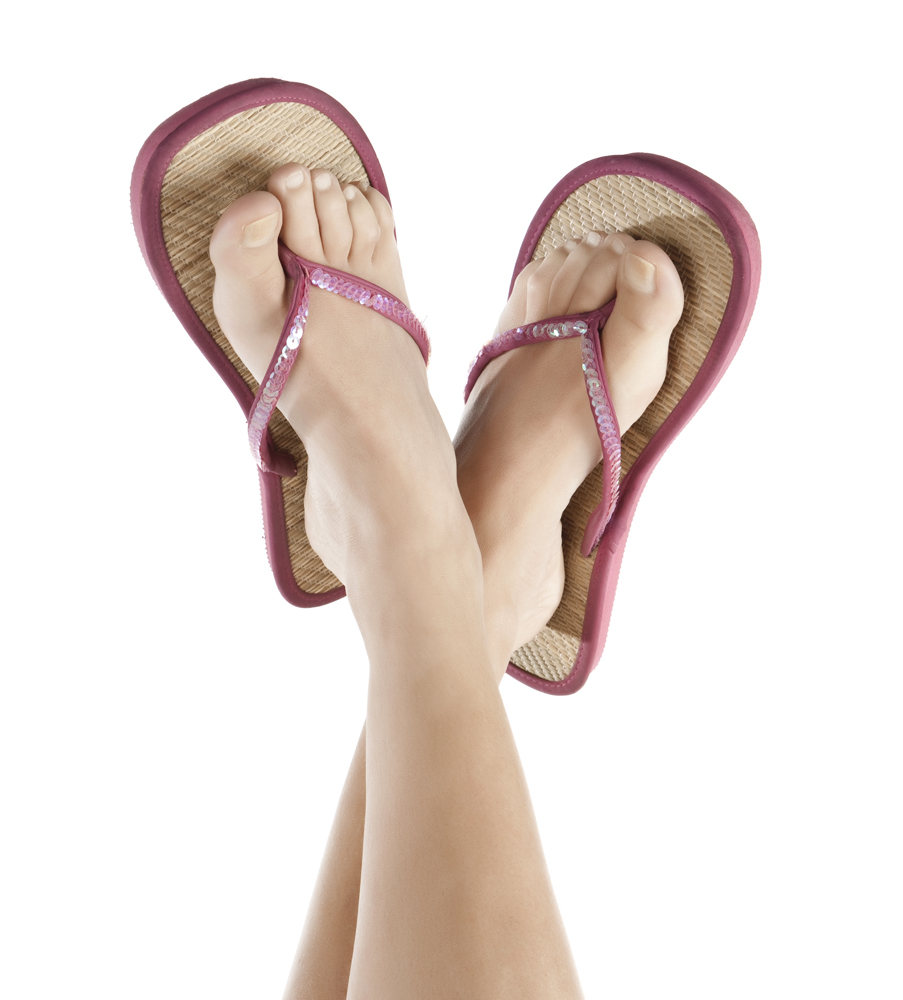 Many people enjoy wearing flip flops, and may be unaware of the potential damage they may cause to the feet. When they are worn for extended periods of time, the ligaments in the arch may become strained. This may lead to pain in the heel and surrounding areas, and can be quite uncomfortable. There is typically little support in the ankle area, and this may lead to ankle sprains. Additionally, the toes may overcompensate for the lack of support in the front of the shoe, and a condition known as hammertoe may develop. If you want to wear flip flops for the majority of the day, it may be beneficial to choose shoes that have a supportive outer sole, which may be helpful in providing the stability the feet need. If you would like additional information about how flip flops may affect the feet, it is suggested to consult with a podiatrist.
Many people enjoy wearing flip flops, and may be unaware of the potential damage they may cause to the feet. When they are worn for extended periods of time, the ligaments in the arch may become strained. This may lead to pain in the heel and surrounding areas, and can be quite uncomfortable. There is typically little support in the ankle area, and this may lead to ankle sprains. Additionally, the toes may overcompensate for the lack of support in the front of the shoe, and a condition known as hammertoe may develop. If you want to wear flip flops for the majority of the day, it may be beneficial to choose shoes that have a supportive outer sole, which may be helpful in providing the stability the feet need. If you would like additional information about how flip flops may affect the feet, it is suggested to consult with a podiatrist.
Flip-flops can cause a lot of problems for your feet. If you have any concerns about your feet or ankles, contact one of our podiatrists from Lovely Foot Associates, PC. Our doctors will assist you with all of your foot and ankle needs.
Flip-Flops and Feet
Flip-flops have managed to become a summer essential for a lot of people. While the shoes may be stylish and easy to slip on and off, they can be dangerous to those who wear them too often. These shoes might protect you from fungal infections such as athlete’s foot, but they can also give you foot pain and sprained ankles if you trip while wearing them.
When Are They Okay to Wear?
Flip-flops should only be worn for very short periods of time. They can help protect your feet in places that are crawling with fungi, such as gym locker rooms. Athlete’s foot and plantar warts are two common fungi that flip-flops may help protect your feet against.
Why Are They Bad for My Feet?
These shoes do not offer any arch support, so they are not ideal for everyday use. They also do not provide shock absorption or heel cushioning which can be problematic for your feet. Additionally, you may suffer from glass cuts, puncture wounds, and stubbed toes since they offer little protection for your feet.
More Reasons Why They Are Bad for Your Feet
If you have any questions, please feel free to contact our office located in Johnstown, PA . We offer the newest diagnostic and treatment technologies for all your foot care needs.
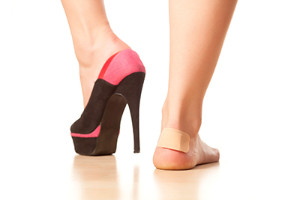 Many women who enjoy wearing high heels may be unaware of the possible harm these types of shoes may do to the feet. When high heels are worn, the weight of the body may get shifted to the joint under the big toe. This may result in the formation of a bunion, which is characterized by a bony protrusion on the side of the big toe. Corns and calluses may form on the bottom of the foot and may result in metatarsalgia. This type of pain is typically felt in the ball of the foot. If you have pain in your heel and surrounding areas, it may lead to a condition that is referred to as plantar fasciitis. It may be similar to the pain and discomfort that is experienced with heel spurs, and both conditions may develop as a result of frequently wearing high heels. If you have any of these symptoms, please consult with a podiatrist who can guide you toward proper treatment.
Many women who enjoy wearing high heels may be unaware of the possible harm these types of shoes may do to the feet. When high heels are worn, the weight of the body may get shifted to the joint under the big toe. This may result in the formation of a bunion, which is characterized by a bony protrusion on the side of the big toe. Corns and calluses may form on the bottom of the foot and may result in metatarsalgia. This type of pain is typically felt in the ball of the foot. If you have pain in your heel and surrounding areas, it may lead to a condition that is referred to as plantar fasciitis. It may be similar to the pain and discomfort that is experienced with heel spurs, and both conditions may develop as a result of frequently wearing high heels. If you have any of these symptoms, please consult with a podiatrist who can guide you toward proper treatment.
High heels have a history of causing foot and ankle problems. If you have any concerns about your feet or ankles, contact one of our podiatrists from Lovely Foot Associates, PC. Our doctors can provide the care you need to keep you pain-free and on your feet.
Effects of High Heels on the Feet
High heels are popular shoes among women because of their many styles and societal appeal. Despite this, high heels can still cause many health problems if worn too frequently.
Which Parts of My Body Will Be Affected by High Heels?
What Kinds of Foot Problems Can Develop from Wearing High Heels?
How Can I Still Wear High Heels and Maintain Foot Health?
If you want to wear high heeled shoes, make sure that you are not wearing them every day, as this will help prevent long term physical problems. Try wearing thicker heels as opposed to stilettos to distribute weight more evenly across the feet. Always make sure you are wearing the proper shoes for the right occasion, such as sneakers for exercising. If you walk to work, try carrying your heels with you and changing into them once you arrive at work. Adding inserts to your heels can help cushion your feet and absorb shock. Full foot inserts or metatarsal pads are available.
If you have any questions please feel free to contact our office located in Johnstown, PA . We offer the newest diagnostic and treatment technologies for all your foot and ankle needs.
 Many women experience foot pain during their pregnancy. This is due to a variety of reasons, which often includes additional weight gain, swelling in the latter stages of pregnancy, and hormonal changes. The added weight may shift the center of gravity, and this will typically put more pressure on the feet. Excess swelling can cause shoes to fit incorrectly, and it may be beneficial to change the style of shoes that are generally worn. Research has indicated that uncomfortable swelling can be kept to a minimum when plenty of fresh water is consumed daily. Additionally, it may be helpful to elevate the feet and reduce sodium content in the foods that are eaten. If your foot pain is severe during your pregnancy, it is suggested that you consult with a podiatrist who can offer proper treatment options.
Many women experience foot pain during their pregnancy. This is due to a variety of reasons, which often includes additional weight gain, swelling in the latter stages of pregnancy, and hormonal changes. The added weight may shift the center of gravity, and this will typically put more pressure on the feet. Excess swelling can cause shoes to fit incorrectly, and it may be beneficial to change the style of shoes that are generally worn. Research has indicated that uncomfortable swelling can be kept to a minimum when plenty of fresh water is consumed daily. Additionally, it may be helpful to elevate the feet and reduce sodium content in the foods that are eaten. If your foot pain is severe during your pregnancy, it is suggested that you consult with a podiatrist who can offer proper treatment options.
Pregnant women with swollen feet can be treated with a variety of different methods that are readily available. For more information about other cures for swollen feet during pregnancy, consult with one of our podiatrists from Lovely Foot Associates, PC. Our doctors will attend to all of your foot and ankle needs.
What Foot Problems Can Arise During Pregnancy?
One problem that can occur is overpronation, which occurs when the arch of the foot flattens and tends to roll inward. This can cause pain and discomfort in your heels while you’re walking or even just standing up, trying to support your baby.
Another problem is edema, or swelling in the extremities. This often affects the feet during pregnancy but tends to occur in the later stages.
How Can I Keep My Feet Healthy During Pregnancy?
If you have any questions please feel free to contact our office located in Johnstown, PA . We offer the newest diagnostic and treatment technologies for all your foot and ankle needs.
Read more about Pregnancy and Foot Health An ingrown toenail can cause discomfort in the foot. The symptoms that are associated with ingrown toenails include reddened skin surrounding the affected nail, discharge from the affected toe, and extreme sensitivity when that part of the foot is touched. This condition may develop due to a variety of reasons, including toenails that have been trimmed incorrectly, wearing shoes that are too tight, or a possible injury that has occurred to the toe. It is important to treat ingrown toenails promptly. Comfort may be found when properly fitting shoes are worn, socks are changed frequently, and the feet are washed daily. If the toenail should become infected, an effective method for complete relief may be to have the nail partially or totally removed. An ingrown toenail can be quite painful. If you feel you have this condition, seek the counsel of a podiatrist who can properly diagnose and treat your condition.
An ingrown toenail can cause discomfort in the foot. The symptoms that are associated with ingrown toenails include reddened skin surrounding the affected nail, discharge from the affected toe, and extreme sensitivity when that part of the foot is touched. This condition may develop due to a variety of reasons, including toenails that have been trimmed incorrectly, wearing shoes that are too tight, or a possible injury that has occurred to the toe. It is important to treat ingrown toenails promptly. Comfort may be found when properly fitting shoes are worn, socks are changed frequently, and the feet are washed daily. If the toenail should become infected, an effective method for complete relief may be to have the nail partially or totally removed. An ingrown toenail can be quite painful. If you feel you have this condition, seek the counsel of a podiatrist who can properly diagnose and treat your condition.
Ingrown toenails may initially present themselves as a minor discomfort, but they may progress into an infection in the skin without proper treatment. For more information about ingrown toenails, contact one of our podiatrists of Lovely Foot Associates, PC. Our doctors can provide the care you need to keep you pain-free and on your feet.
Ingrown Toenails
Ingrown toenails are caused when the corner or side of a toenail grows into the soft flesh surrounding it. They often result in redness, swelling, pain, and in some cases, infection. This condition typically affects the big toe and may recur if it is not treated properly.
Causes
You are more likely to develop an ingrown toenail if you are obese, have diabetes, arthritis, or have any fungal infection in your nails. Additionally, people who have foot or toe deformities are at a higher risk of developing an ingrown toenail.
Symptoms
Some symptoms of ingrown toenails are redness, swelling, and pain. In rare cases, there may be a yellowish drainage coming from the nail.
Treatment
Ignoring an ingrown toenail can have serious complications. Infections of the nail border can progress to a deeper soft-tissue infection, which can then turn into a bone infection. You should always speak with your podiatrist if you suspect you have an ingrown toenail, especially if you have diabetes or poor circulation.
If you have any questions, please feel free to contact our office located in Johnstown, PA . We offer the newest diagnostic and treatment technologies for all your foot care needs.
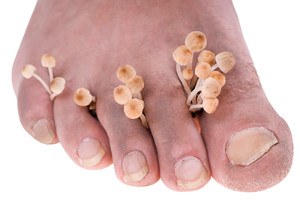 Athlete’s foot is a common foot condition that many people experience. It typically affects the area between the toes in addition to the bottom of the feet. There are several symptoms that are associated with this ailment. These may include redness, dry areas in the affected portions of skin, or extreme itchiness. This contagious fungal infection is generally found in public places, which may include community pools, shower room floors, and surrounding areas. Patients who have certain existing medical conditions may have an increased risk of getting athlete’s foot. These include a weak immune system, eczema, or certain allergies. Mild relief can be found while using an anti-fungal spray. For stubborn and severe cases of athlete’s foot, it is strongly suggested that you consult with a podiatrist who can properly treat your condition.
Athlete’s foot is a common foot condition that many people experience. It typically affects the area between the toes in addition to the bottom of the feet. There are several symptoms that are associated with this ailment. These may include redness, dry areas in the affected portions of skin, or extreme itchiness. This contagious fungal infection is generally found in public places, which may include community pools, shower room floors, and surrounding areas. Patients who have certain existing medical conditions may have an increased risk of getting athlete’s foot. These include a weak immune system, eczema, or certain allergies. Mild relief can be found while using an anti-fungal spray. For stubborn and severe cases of athlete’s foot, it is strongly suggested that you consult with a podiatrist who can properly treat your condition.
Athlete’s foot is an inconvenient condition that can be easily reduced with the proper treatment. If you have any concerns about your feet and ankles, contact one of our podiatrists from Lovely Foot Associates, PC. Our doctors will treat your foot and ankle needs.
Athlete’s Foot: The Sole Story
Athlete's foot, also known as tinea pedis, can be an extremely contagious foot infection. It is commonly contracted in public changing areas and bathrooms, dormitory style living quarters, around locker rooms and public swimming pools, or anywhere your feet often come into contact with other people.
Solutions to Combat Athlete’s Foot
Athlete’s foot can cause many irritating symptoms such as dry and flaking skin, itching, and redness. Some more severe symptoms can include bleeding and cracked skin, intense itching and burning, and even pain when walking. In the worst cases, Athlete’s foot can cause blistering as well. Speak to your podiatrist for a better understanding of the different causes of Athlete’s foot, as well as help in determining which treatment options are best for you.
If you have any questions please feel free to contact our office located in Johnstown, PA . We offer the newest diagnostic and treatment technologies for all your foot and ankle needs.